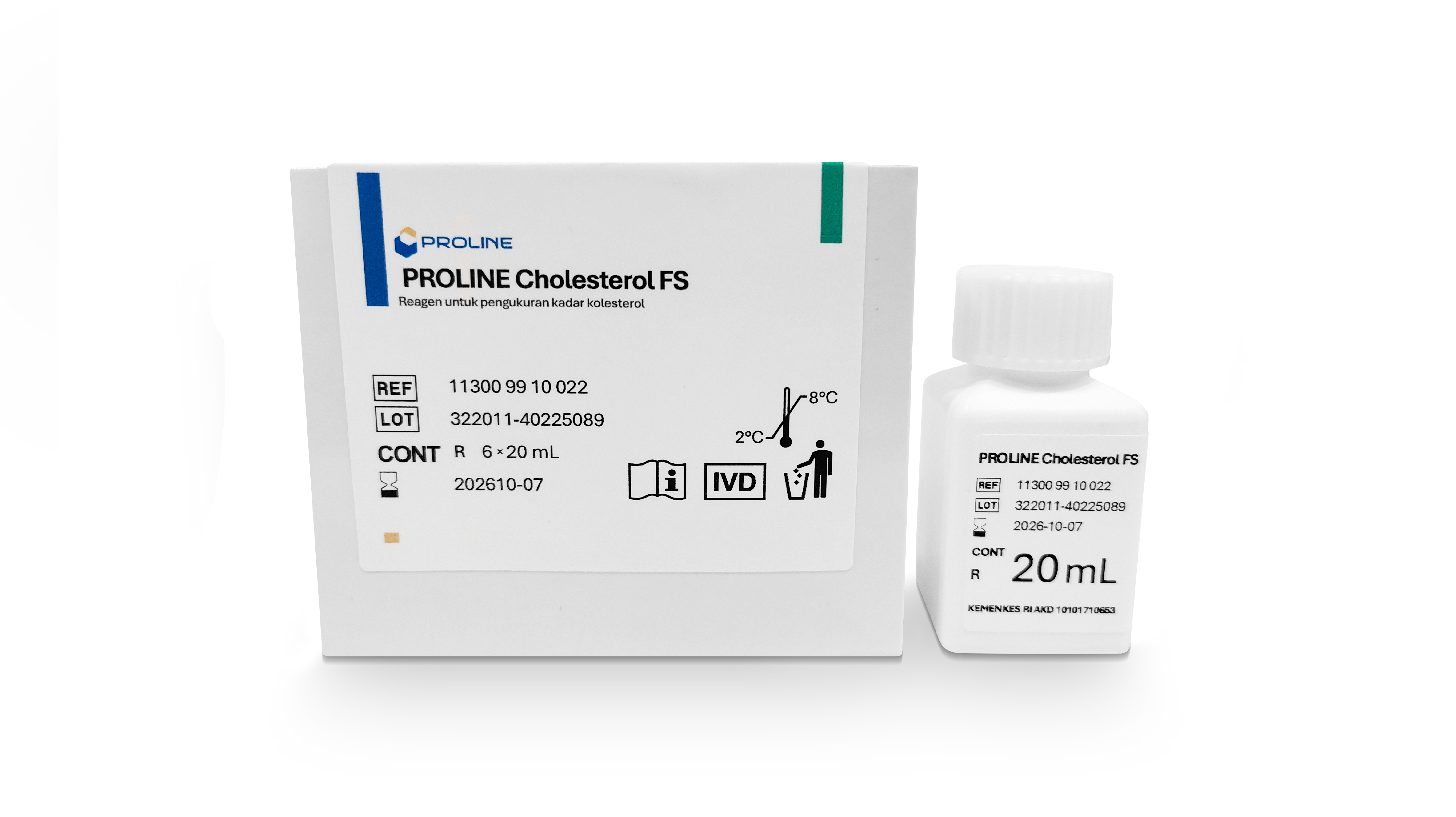PROLINE Cholesterol FS

| Catalogue Number | R/Mono Reagent Volume | Standard Volume |
| 11300 99 10 923 | 4 x 43 mL | - |
| 11300 99 10 192 | 4 x 60 mL | - |
| 11300 99 10 182 | 4 x 60 mL | - |
| 11300 99 10 022 | 6 x 20 mL | - |
| 11300 99 10 025 | 4 x 80 mL | - |
| 11300 99 10 029 | 4 x 200 mL | - |
| 11300 99 10 027 | 4 x 62.5 mL | 1 x 3 mL |
| 11300 99 10 023 | 6 x 20 mL | 1 x 3 mL |
| 11300 99 10 026 | 4 x 80 mL | 1 x 3 mL |
| 11300 99 10 019 | 2 x 50 mL | - |
| 11300 99 10 039 | 2 x 50 mL | 1 x 3 mL |
| 11300 99 10 024 | 5 x 50 mL | - |
| 11300 99 10 034 | 5 x 50 mL | 1 x 3 mL |
Diagnostic reagent for the quantitative determination of cholesterol in human serum or heparin plasma in vitro using a photometric system.
PROLINE Cholesterol FS is a colorimetric test based on enzymatic hydrolysis and oxidation for the determination of total cholesterol levels in serum and plasma. Cholesterol measurement is part of the standard lipid profile and is used for screening purposes in assessing atherosclerosis risk.
Cholesterol is an essential lipid component for the body, playing a crucial role in forming cell membranes and acting as a precursor for the synthesis of steroid hormones such as estrogen, testosterone, and cortisol. Cholesterol is also required for the production of bile acids, which aid in fat digestion. The human body obtains cholesterol from two main sources: synthesis by the liver and dietary intake from foods such as meat, eggs, and dairy products. In blood plasma, cholesterol is transported by lipoproteins, which form complexes between lipids and proteins.
The body contains four main types of lipoproteins: high-density lipoprotein (HDL), low-density lipoprotein (LDL), very low-density lipoprotein (VLDL), and chylomicrons. LDL, often referred to as "bad cholesterol," functions to carry cholesterol from the liver to body tissues, but excess LDL can form plaque in the blood vessels. In contrast, HDL, known as "good cholesterol," helps transport excess cholesterol from tissues back to the liver for disposal. VLDL is responsible for carrying triglycerides from the liver to tissues, while chylomicrons transport dietary fats after digestion.
Coronary artery disease (CAD) occurs when the coronary blood vessels become narrowed by atherosclerotic plaques formed primarily from cholesterol, especially LDL. This narrowing disrupts blood flow to the heart muscle, increasing the risk of heart attacks or heart failure. Risk factors such as high LDL levels, hypertension, diabetes, smoking, and an unhealthy diet exacerbate the condition. Preventing CAD can be achieved by adopting a healthy lifestyle, including a diet low in saturated fats, regular exercise, and, if necessary, medical treatment to lower cholesterol levels.
Using the "CHOD-PAP" method with an enzymatic photometric test.
- Ready-to-use liquid reagent (open-system) without reconstitution
- Excellent linearity and stability performance
- Available in MPK (Multi-Purpose Kit) and dedicated kit
- Compatible with >65 brands of manual and automated clinical chemistry analyzers
| Sample type | Serum or plasma |
| Measurement range | 0.86 mg/dL - 750 mg/dL |
| Analysis wavelength | 500 nm, Hg 546 nm |
| Analysis mode | End-Point |
| Reagent volume used (analyzer manual) | 1000 µL |
| Sample volume used (analyzer manual) | 10 µL |
| Storage temperature | 2 – 8 °C |
| Open vial stability | 18 months |
| Expiration date | 24 months |
| Control for Cholesterol Reagent | Calibrator for Cholesterol Reagent |
| TruLab N | TruCal U |
| TruLab P | Cholesterol Standard FS |
| TruLab L Level 1 | |
| TruLab L Level 2 |
| Reference Range: | ||
| mg/dL | μmol/L | |
| Reference | < 200 | < 5.18 |
| High-Risk Threshold | 200 – 239 | 5.18 – 6,.9 |
| High Risk | ≥ 240 | ≥ 6.22 |
- Cholesterol Reagents
- Doos
- Kit insert
- Reagents bottle
- Kit Insert PROLINE Cholesterol FS - Ed.02 - 11300 01 A – Sep 2024/02.
- DiaSys Diagnostic Systems GmbH. (n.d.). Cholesterol FS – Enzymatic colorimetric test for cholesterol quantification. Retrieved April 19, 2025, from https://www.diasys-diagnostics.com/products/reagents/clinical-chemistry/reagent-details/43-cholesterol-fs-10/reagent.show
- Rafieian-Kopaei, M., & Nasri, H. (2023). Biochemistry, Cholesterol. In StatPearls. StatPearls Publishing. Retrieved from https://www.ncbi.nlm.nih.gov/books/NBK513326
- Cífková, R., & Šatný, M. (2022). Lipids and lipoproteins in cardiovascular diseases: A classification. Advances in Clinical Chemistry, 109, 85–113. https://doi.org/10.1016/bs.acc.2022.01.002
- Brochure : INA
- Atherosclerosis
- Lipid Metabolism
Contact our team to find out more product information and ordering
- Telp : +62 21 8984 2722
- WhatsApp : +62 815 1359 2626
- Email : marketing@proline.co.id
Contact our Technical support team for further assistance with product specifications, services and other technical documents.
- Telp : +62-21-8984-2722
- WhatsApp : +62-817-9324-884
- Email : technical.support@prodis.co.id
